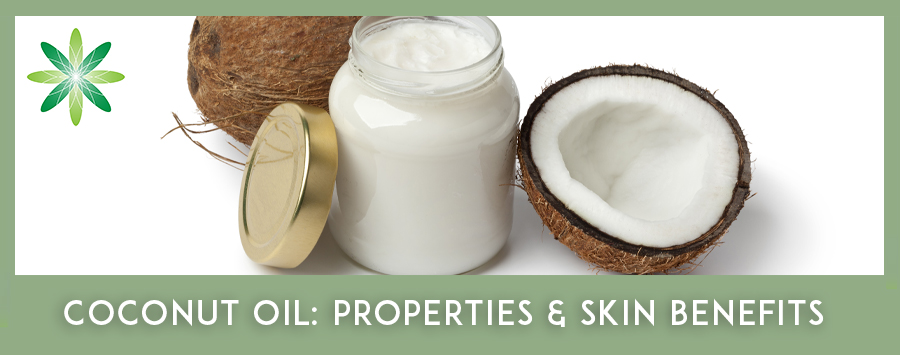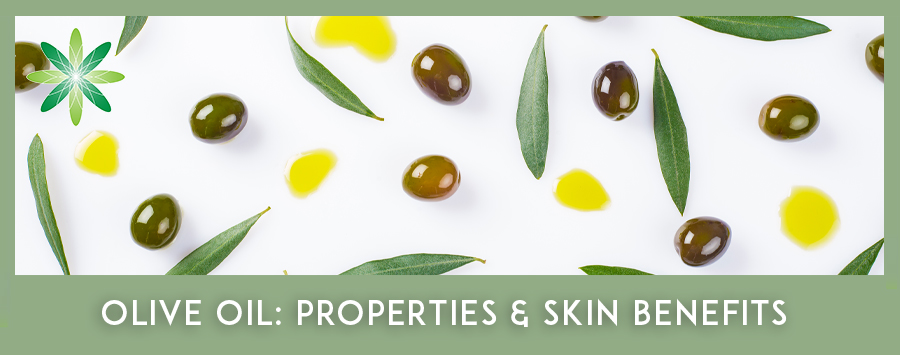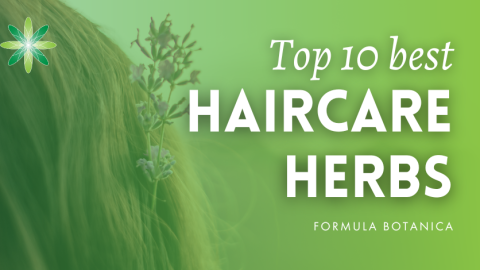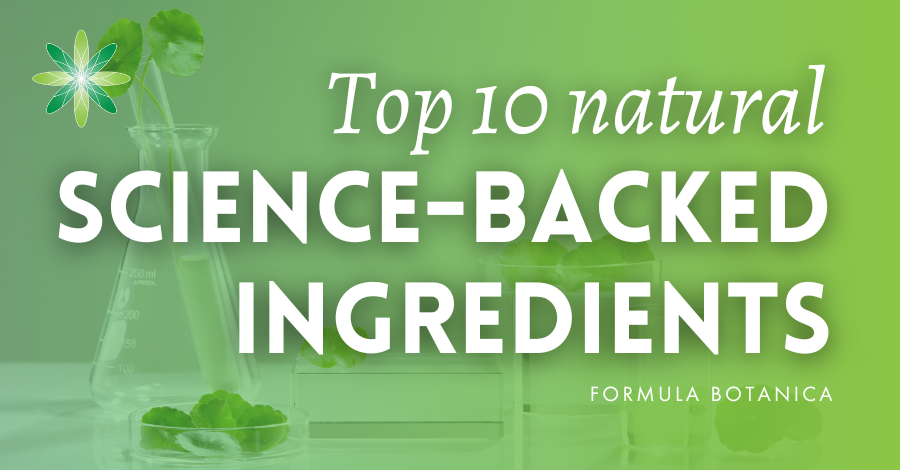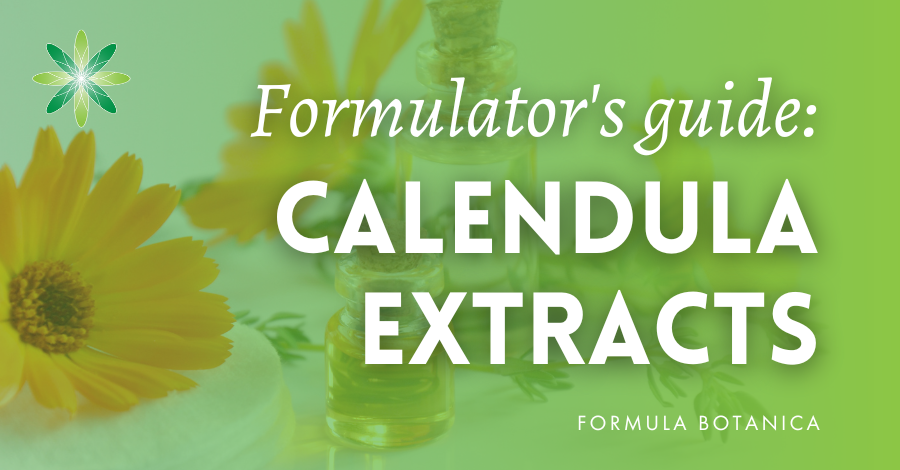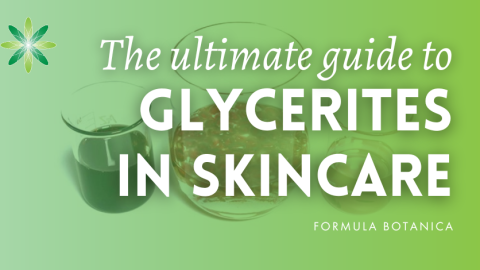Creating your own natural skincare is a rewarding and empowering skill that anyone can learn. Our thousands of formulation students around the globe take our award-winning online courses to learn how to make incredible lotions, serums, cleansers, toners and masks, using the finest botanical ingredients. And there is no better way to get started than by raiding your kitchen cupboards when you first get started!
We frequently see people new to formulation look to the oils that they cook with and try them on their skin, which is why coconut oil and olive oil are great ingredients to get started with. But which one is better for skincare? Join us for the great coconut oil vs olive oil for skin battle, in which we break down these two oils by their scientific properties and skin benefits.
When you first start creating your own natural skincare using botanical ingredients, you’ll soon realise that there is a whole world of amazing carrier oils available to use for skincare.
Which is better in skincare: coconut oil or olive oil? @FormulaBotanica unpicks the great carrier oil debate. #naturalskincare #greenbeauty #DIYbeauty Share on XRead more: How to Make Natural Skincare Products: a Step-by-Step Guide
Coconut Oil: Scientific Properties
Let’s start off by looking at whether coconut oil is better than olive oil in terms of its scientific properties.
Coconut oil (INCI: Coconut nucifera oil) is a unique carrier oil, because it contains high levels (over 90%) of saturated fatty acids. When we talk about coconut oil in this article, we’re talking about virgin coconut oil which has been obtained from the coconut palm by mechanical means and doesn’t lead to any chemical refining, bleaching or deodorising of the oil.
Coconut oil is particularly high in a compound called lauric acid, which is an excellent emollient (moisturiser) and antibacterial compound. One study in 2009 found that lauric acid decreased acne and acne-caused inflammation [1]. However, it is important to note that this study used mouse ears and not human skin (which we do not condone at Formula Botanica, as we are strongly against animal testing). This type of research is also not always representative of the way that our human skin would respond to a chemical compound.
Read more: Why you should NOT use Coconut Oil as a Sunscreen
Coconut oil is also high in myristic acid and palmitic acid. Myristic acid is also anti-inflammatory and similar to lauric acid, can help strengthen the skin’s barrier repair function. Palmitic acid creates a nice protective layer with no stickiness or greasiness. Palmitic acid makes an excellent ingredient for a winter skin and haircare when you need a protective layer over your skin or hair and a long-lasting emolliency.
Read more: 10 Best Winter Carrier Oils
Coconut Oil: Skin Benefits
When looking at the skin benefits of coconut oil, the first question we want to answer is whether coconut oil is comedogenic (causes spots) when used on the skin.
Before you start Googling the comedogenicity of coconut oil, please remember that the comedogenicity scale was created in the 1970s by applying ingredients to rabbit ears, so these numbers may not reflect the effect of coconut oil on human skin.
Coconut oil does take a long time to penetrate the skin though, given how saturated the oil is, you may find that it leaves your skin feeling greasier than, for instance, using a fast-penetrating oil such as flaxseed oil or kiwi seed oil.
Nonetheless, coconut oil has great potential as a rich moisturiser. Its moisturising properties are thought to be derived from its ability to enhance skin barrier function through its anti-inflammatory response [2]. One study further found that virgin coconut oil used in baby massage improved skin barrier function in low-birth-weight babies [3].
Coconut oil is although thought to have antibacterial properties. It was further investigated in another study, which found that the oil is able to help by moisturising extremely dry skin and clearing skin infections on compromised skin [4].
Now that we’ve investigated coconut oil in a bit more detail, let’s take a look at olive oil so that we can continue with the great coconut oil vs olive oil battle.
Olive Oil: Scientific Properties
Olive oil (INCI: Olea europaea oil) is one of the best-known oils in the world and it is quite possible that you already have a bottle of it in your kitchen. However, before you dash to your kitchen cupboards, it is worth noting that olive oil is one of the most adulterated oils in the world because many people want their cooking oil to be light in flavour, scent, colour and price. In other words, cosmetic-grade oils are generally of better quality than food-grade oils.
Olive oil contains many interesting chemical compounds, but we’ll only highlight two for the purposes of us looking at the benefits of coconut oil vs olive oil.
Firstly, olive oil is a good source of plant-based squalene, which is a chemical compound that reduces trans-epidermal water loss (TEWL) to restore skin suppleness and flexibility. Trans-epidermal water loss (TEWL) is the amount of water that passively evaporates through skin to the external environment due to water vapor pressure gradient on both sides of the skin barrier and is used to characterise skin barrier function. Squalene is part of olive oil’s unsaponifiable fraction, which also contains compounds such as erythrodiol and beta-sitosterol [5].
Read now: The Formulator’s Ultimate Guide to Squalene and Squalane
Secondly, olive oil contains an antioxidant called hydroxytyrosol, a rare and potent polyphenol compound found in the highest concentrations in the best olive oils. Hydroxytyrosol is believed to play a significant role in the many health benefits attributed to olive oil. Studies have shown anti-inflammatory activity from this compound [6].
Hydroxytyrosol is part of the polar fraction of olive oil, which also contains phenolic compounds such as oleuropein, tyrosol and caffeic acid. It is important to note that this natural antioxidant is often destroyed during processing or refining of lower quality oils which is why it is important to buy the best cold pressed oils you can find.
Olive Oil: Skin Benefits
Nowadays what many people don’t realise is something that people living in ancient Egypt and Greece took for granted; that unadulterated extra virgin olive oil, all by itself, has the potential to benefit the skin. Extra virgin olive oil has the added advantage of containing strong antioxidants, making it a natural anti-ageing ingredient.
There has been relatively little scientific work done on the effect of olive oil on acne and other skin conditions. However, one study noted that the abundance of squalene in oils in general shows promise for people with a range of skin conditions, although the study did conclude the squalene levels are higher in amaranth oil than olive oil [5].
Research has further not found any evidence of olive oil helping with anything other than severe stretch marks. One study followed a group of 100 women in Tehran who were pregnant with their first child, half of whom were asked to apply olive oil twice daily to their abdomen. The study found that olive oil reduces the incidence of severe stretch marks and actually increases the incidence of mild stretch marks, but it does not significantly reduce the incidence and the severity of stretch marks and it could not be recommended for prevention of stretch marks [7].
Coconut Oil vs Olive Oil for Skin: Who’s the Winner?
Having read our analysis of coconut oil vs olive oil, it’s time for the big reveal – who is the winner? And the winner is (drumroll…):
There is no winner.
We can hear you booing us as you read this article, but it’s important to recognise that what works for one person might be a complete disaster for another. Both oils have the potential to be fabulous in skincare. Both carrier oils contain a wide variety of chemical components that can deliver antioxidant or potentially even anti-inflammatory properties to skin. In other words, you can’t really pit coconut oil vs olive oil, because it’s a bit like comparing apples with oranges.
The only way you can fully declare a winner for yourself is by trying it on your skin and seeing how you react. In fact, once you start formulating organic skincare for yourself, you’ll discover a whole world of amazing carrier oils that you can apply neat to the skin.
You might find yourself investigating kiwi seed oil, plum kernel oil, cucumber seed oil, tomato seed oil, argan oil, poppy seed oil, elderberry seed oil, cranberry seed oil, pumpkin seed oil, safflower oil, borage oil, evening primrose oil, avocado oil or perilla seed oil, or any of the hundreds of other oils available to you as a formulator.
You might even start infusing your own oils with dried herbs to create beautiful macerated oils. The possibilities are endless. We want you to understand that you are don’t need to be limited by simply focusing on the great coconut oil vs olive oil battle!
Which is your favourite: coconut oil or olive oil? Leave us a comment below and tell us which one you prefer – and why?
Want to learn more about making organic skincare? Pre-register for our Diploma in Organic Skincare Formulation and learn how to create your very own home-based organic skincare brand, using coconut oil, olive oil and any of the hundreds of other carrier oils available to botanical formulators.
FAQ
Coconut oil is particularly high in a compound called lauric acid, which is an excellent emollient (moisturiser) and antibacterial compound.
Coconut oil has great potential as a rich moisturiser. Its moisturising properties are thought to be derived from its ability to enhance skin barrier function through its anti-inflammatory response
Olive oil is a good source of plant-based squalene, which is a chemical compound that reduces trans-epidermal water loss (TEWL) to restore skin suppleness and flexibility. It also contains an antioxidant called hydroxytyrosol, a rare and potent polyphenol compound found in the highest concentrations in the best olive oils.
One study noted that the abundance of squalene in oils in general shows promise for people with a range of skin conditions, although the study did conclude the squalene levels are higher in amaranth oil than olive oil.
Both carrier oils contain a wide variety of chemical components that can deliver antioxidant or potentially even anti-inflammatory properties to skin. The only way you can fully declare a winner for yourself is by trying it on your skin and seeing how you react. In fact, once you start formulating organic skincare for yourself, you’ll discover a whole world of amazing carrier oils that you can apply neat to the skin.
References
- Nakatsuji, et al. 2009. Antimicrobial Property of Lauric Acid Against Propionibacterium Acnes: Its Therapeutic Potential for Inflammatory Acne Vulgaris. J Invest Dermatol. 2009 Oct;129(10):2480-8.
- Varma, et al., 2019. In vitro Anti-Inflammatory and Skin Protective Properties of Virgin Coconut Oil. J Tradit Complement Med. 2018 Jan 17;9(1):5-14
- Nangia S, Paul V, Chawla D, et al. 2008. Topical coconut oil application reduces transepidermal loss in preterm very low birth weight neonates: a randomized clinical trial. Pediatrics 2008; 121: S139.
- Verallo-Rowell VM, Dillague KM, Syah-Tjundawan BS. Novel antibacterial and emollient effects of coconut and virgin olive oils in adult atopic dermatitis. Dermatitis. 2008 Nov-Dec;19(6):308-15.
- Wołosik K, Knaś M, Zalewska A, Niczyporuk M, Przystupa AW. 2013. The importance and perspective of plant-based squalene in cosmetology. J Cosmet Sci. 2013 Jan-Feb;64(1):59-66.
- Fernández-Bolaños, et al., 2008. Hydroxytyrosol and Derivatives: Isolation, Synthesis, and Biological Properties. Current Organic Chemistry, 2008, 12, 442-463.
- Soltanipoor F, Delaram M, Taavoni S, Haghani H. 2012 The effect of olive oil on prevention of striae gravidarum: a randomized controlled clinical trial. Complement Ther Med. 2012 Oct;20(5):263-6.
FREE TRAINING
Learn how to become an
Organic Skincare Formulator
FREE TRAINING
How to become an
Organic Skincare Entrepreneur
FREE TRAINING
How to become an
Organic Skincare Entrepreneur
Leave us a comment
Lorraine Dallmeier is a Biologist, Chartered Environmentalist and the CEO of Formula Botanica, the award-winning online organic cosmetic science school. Read more about Lorraine and the Formula Botanica Team.


